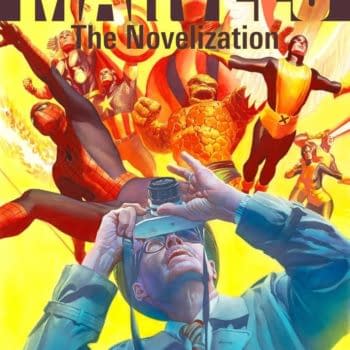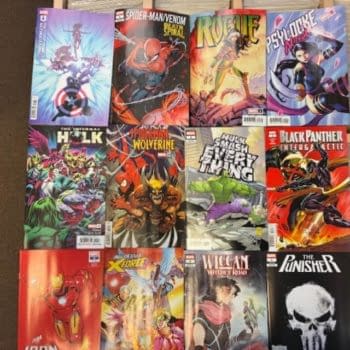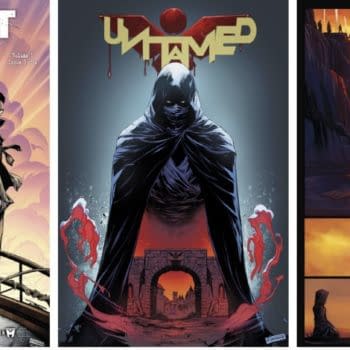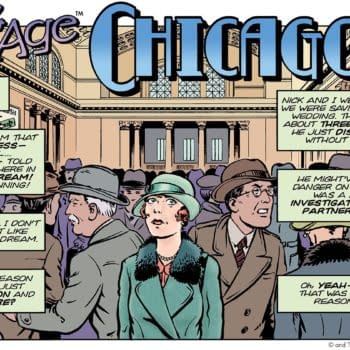Posted in: Comics | Tagged: comic con, Comixwriter, First Comis, Glenn Farrington, larry young, lives
Telling Stories And Filling A Need In The Comic Industry – Interview With Glenn Farrington
Recently I wrote a column about the Kickstarter project for ComiXwriter, a comic book screenwriting program and I'm absolutely fascinated by it. Part of it comes from the frustration of using a word processing program to do scripts (like using a hammer to drive in a screw) and the other part was a similarly shared background with one of the creators Glenn Farrington. I used to write computer code during the day and comics at night, Glenn built a business on putting internet café's into cruise ships while doing screenplays, so when I had the opportunity to ask him a few questions, I jumped at the chance.
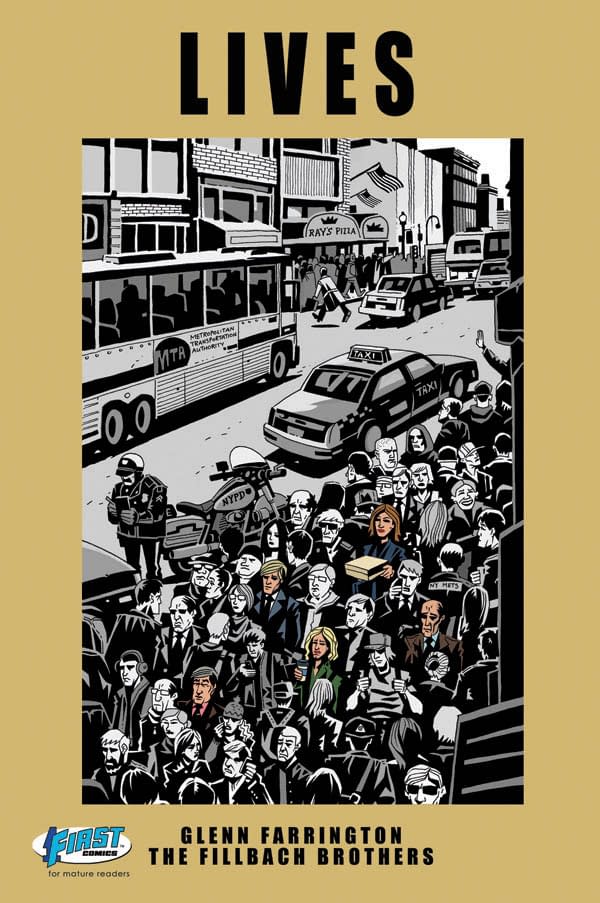
The inspiration came from attending the ART OF THE THRILL KILL comic con panel in 2012. I wanted to expand my usual comic con panel list by listening to some professional horror and thriller novelists discuss how they create stories that are not only psychologically but atmospherically disturbing. The stunning Michelle Gangnon, one of the authors, explained how ideas come to her at times most would find extremely disturbing. She would see a terrible event first hand and notice how everyone would react in horror…and she would only think," what a great story this would make". I started thinking about events that I found disturbing. On the way back into Comic Con's exhibit floor I flushed out the story of LIVES in my head. Being at Comic Con, it was hard not to think of doing it in any other medium. I went to AiT Planet Lar's booth and pitched it to my friend and publisher Larry Young who introduced me to the Fillbach Brothers. A few months later First Comics got wind of it and wanted to publish it. The fact it debuted at Comic Con this year really brought LIVES full circle.

I could go on for hours about The Fillbach Brothers. Matt and Shawn are the two of the most creative phenoms I've ever met. Like I mentioned, Larry introduced us but I was already familiar with their work. My son had the Star Wars Clone Wars books they worked on. That day they showed me some of the projects they were working on. I can honestly say I've never seen anyone as gifted with inks and the use of negative space like these guys accomplished. That very same day, I was present when Charlie Adlard came by and looked at their work. He was completely blown away with their style. I've found working with them to be a completely different experience than with other artists. I remember feeling bad that I had written a page in my script that had eight panels. I kept feeling like I didn't give them enough room for their artistic expression of my story. So I called them up. They said don't worry, we got it. Imagine my surprise when I got the artwork for that page and it sixteen panels. Freaking sixteen panels. I stopped feeling bad immediately. Here's the amazing thing. That page (and the few others with the same panel count) was amazing. It wasn't busy, it stayed on track tone and story wise and it even pulled you more into the moment. That type of work just exemplifies how they see their role in doing the art for comic books. They see it like film Directors. They take your script and then retell the story using a visual medium. All three of us learned so much more about the story as we went along. Collaboration at its finest. It might be my story and script, but LIVES is our book.
This is your first foray into the comic industry but you are an experienced screenwriter. From a storytelling stand point, what are the strength and weaknesses of comics in comparison to film/screenplays?
You always hear how the biggest upside of comics compared to film/screenplays is the unlimited budget. That's probably true, but I've seen people in both industries put out some bad stories that were high concepts. Here's the biggest difference, from a writers standpoint, when it comes to comparing the two industries. As a screenwriter, if you were to write any kind of direction in your expositions (the actor placement on screen, camera angles, type of shot etc) you'd immediately come off as a hack. Your job is to write the story not tell the Director how to shoot it; unless of course you're Quentin Tarantino who wrote and directed it. Not a lot like him out here in LA. I can't begin to tell you the freedom I felt when I wrote my first comic book script. For comic books, you have to give the artist an idea of how you see it. The only way to do that is to actually GIVE direction in the exposition. At the end of the day it still comes down to the artists interpretation of your words…but as a writer, it does give you the feeling that you have some control over how your story is going to actually look on paper. There is no such thing as a screenwriter who ever thinks their story will show up on the screen exactly the way they envisioned it. If that ever happened, I wouldn't be surprised if that writer died of a heart attack.
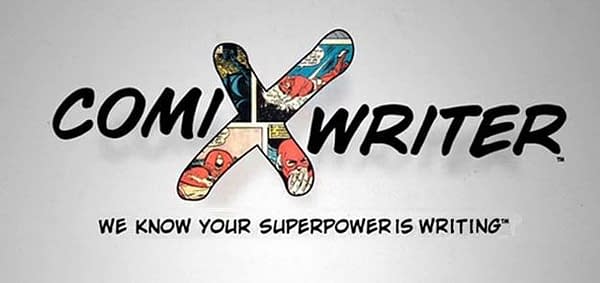
Biggest shortcoming, none of the software currently available are for comic books. Right off the bat you're forced to shoehorn your needs out of something that wasn't even made for you. You either doing most of the work structure in a word processor, or only be given the choice of a couple different ways to write it in any of the writing programs. What comic book writer wants to be put in a box like that? Here you go…write it this way and be happy. The one thing about comic writing that differs from most other types of writing, is that there is no one way to do it! Sure at the end of the day there are similarities…but with existing free/almost free and fraking expensive software. It's their way or the highway. Guess what, the next stop on the highway is ComiXwriter. You no longer have to worry about things as simple as page breaks. You don't have to worry about importing your script into another program just so you can get it into a format a letterer can use. You want to piss off a letterer, send them a screenplay file or a pdf. With ComiXwriter you're not limited to the format you can write in. We offer many sample scripts for you to choose from and then, if you should decide, you can alter that script format to your own style of writing. Then, ComiXwriter takes over and automates the structure for you. Page count, Panel numbering, Character Names, line spacing, margins etc. When you don't have to worry about the structure it frees you up for more important things like story!
This isn't rocket science. It's just a super charged word processor. This should have been done ages ago. I'm sure I'm not the only guy who said this should happen, I'm just the kind of guy who commits to my ideas. ComiXwriter also allows you to imbed graphics/photos into your script. This is a huge help for the artist if you have ideas how certain things should look. You have the choice of seeing the graphics while you write or keep them hidden. Same thing applies when you send the script out. My favorite feature and one that no other software even comes close to…is our collaborating editor. We allow you to pull up a page of artwork side by side next to the script page you wrote. This allows you to edit your script if need be and/or make notations on the artwork. Then you can send it to the artist, colorist, letterer etc. There are many more features we offer, from keeping track of changes to outlining your script…but at the end of the day, the one thing you can rely on is that ComiXwriter, unlike every other software, is dedicated solely to your comic book writing needs.

I guess I've already addressed much of this in the last question, but ComiXwriter offers you the ability to choose from many sample scripts the format that best suits you and if you want, can alter it to fit your own personal style. That would include, but not limited to, whether or not the page headings are centered or left justified, if the panel numbers are bold or italicized down and how the dialogue will be presented. How we went about deciding what script formats to use as samples came from going directly the horse's mouth. I contacted a lot of professional comic book writers and part time comic book creators about what kind of features they would like to see in a program like this and I asked them to send me one of their sample scripts. I think in the vast amount of scripts we received only two were alike. But, what we did start to see are patterns. It's from those patterns of structure that allowed us to come up with the sample scripts offered in ComiXwriter. I'm very thankful to have a partner like Steven Sashen. Because of his work in developing Scriptware, the very first screenwriting software, we were able to not only see those patterns but understand how we could code them. ComiXwriter is the world's first software that gives comic book and graphic novel writers the freedom they deserve. Comic book writers should only be thinking about getting down the story, ComiXwriter will do the rest.
The ComiXwriter Kickstarter only has a day or so left, ending at 4PM EDT this Friday (July 26th). They are close to hitting their goal but still need a little bit more to get there. If you are a comic writer or just dream of being one, do yourself a favor, check out the Kickstarter and back them. And check out Glenn's book Lives from First Comics.










